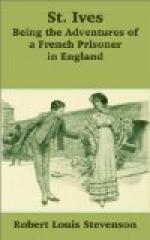We came to our stages at all sorts of odd hours, and they were in all kinds of odd places. I may say at once that my first experience was my best. Nowhere again were we so well entertained as at Burchell Fenn’s. And this, I suppose, was natural, and indeed inevitable, in so long and secret a journey. The first stop, we lay six hours in a barn standing by itself in a poor, marshy orchard, and packed with hay; to make it more attractive, we were told it had been the scene of an abominable murder, and was now haunted. But the day was beginning to break, and our fatigue was too extreme for visionary terrors. The second or third, we alighted on a barren heath about midnight, built a fire to warm us under the shelter of some thorns, supped like beggars on bread and a piece of cold bacon, and slept like gipsies with our feet to the fire. In the meanwhile, King was gone with the cart, I know not where, to get a change of horses, and it was late in the dark morning when he returned and we were able to resume our journey. In the middle of another night, we came to a stop by an ancient, whitewashed cottage of two stories; a privet hedge surrounded it; the frosty moon shone blankly on the upper windows; but through those of the kitchen the firelight was seen glinting on the roof and reflected from the dishes on the wall. Here, after much hammering on the door, King managed to arouse an old crone from the chimney-corner chair, where she had been dozing in the watch; and we were had in, and entertained with a dish of hot tea. This old lady was an aunt of Burchell Fenn’s—and an unwilling partner in his dangerous trade. Though the house stood solitary, and the hour was an unlikely one for any passenger upon the road, King and she conversed in whispers only. There was something dismal, something of the sick-room, in this perpetual, guarded sibilation. The apprehensions of our hostess




